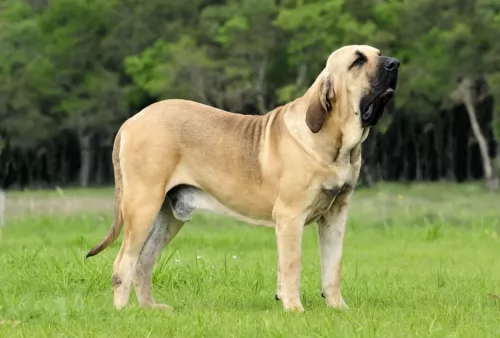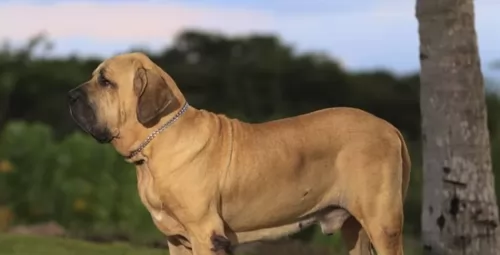 Petzlover
Petzlover American Staghound is originated from United States but Fila Brasileiro is originated from Brazil. Both American Staghound and Fila Brasileiro are having almost same height. American Staghound may weigh 39 kg / 85 pounds lesser than Fila Brasileiro. Both American Staghound and Fila Brasileiro has almost same life span. American Staghound may have less litter size than Fila Brasileiro. American Staghound requires Low Maintenance. But Fila Brasileiro requires Moderate Maintenance
American Staghound is originated from United States but Fila Brasileiro is originated from Brazil. Both American Staghound and Fila Brasileiro are having almost same height. American Staghound may weigh 39 kg / 85 pounds lesser than Fila Brasileiro. Both American Staghound and Fila Brasileiro has almost same life span. American Staghound may have less litter size than Fila Brasileiro. American Staghound requires Low Maintenance. But Fila Brasileiro requires Moderate Maintenance
 The American Staghound is hunting dog and type of sighthound that is not recognized as a separate breed. They have historically been bred to hunt coyotes and then other game. Even though they are not considered a separate breed some of their breeding lines have existed much longer than some officially recognized breeds. The American Staghound is a cross between the Greyhound and the Scottish Deerhound. There was probably some Borzoi mixed in as well. The Staghound is believed to have traveled with General Custer across the American West.
The breed is a long-legged running dog with the speed of a Greyhound, the sighting ability of sight hounds and more endurance than any running breed. They are incredible athletes with amazing agility and have been bred to course game – coyotes mostly – and therefore are bred with a very intense prey drive. In the past they chased stags and deer and today they chase coyotes and hare. Coyotes are much faster than wolves and fight just as hard. The American Staghound is the only breed fast enough to track down the coyote. However, the breed is not recognized by the AKC.
Hunting with an American Staghound today is not very different from hunting with them in medieval times. Strict breeding practices and the non-commercialization of the breed has led to the almost perfect preservation of this hunting breed. They have not changed very much over the centuries. They have been breeding Staghound to Staghound since the early 1800’s. At times very, good hunting dogs from Greyhound and Deerhound stock are added to the mix. For hundreds of years now the closed breeding has led to what might be the finest coyote chasing sighthound possible.
The American Staghound is hunting dog and type of sighthound that is not recognized as a separate breed. They have historically been bred to hunt coyotes and then other game. Even though they are not considered a separate breed some of their breeding lines have existed much longer than some officially recognized breeds. The American Staghound is a cross between the Greyhound and the Scottish Deerhound. There was probably some Borzoi mixed in as well. The Staghound is believed to have traveled with General Custer across the American West.
The breed is a long-legged running dog with the speed of a Greyhound, the sighting ability of sight hounds and more endurance than any running breed. They are incredible athletes with amazing agility and have been bred to course game – coyotes mostly – and therefore are bred with a very intense prey drive. In the past they chased stags and deer and today they chase coyotes and hare. Coyotes are much faster than wolves and fight just as hard. The American Staghound is the only breed fast enough to track down the coyote. However, the breed is not recognized by the AKC.
Hunting with an American Staghound today is not very different from hunting with them in medieval times. Strict breeding practices and the non-commercialization of the breed has led to the almost perfect preservation of this hunting breed. They have not changed very much over the centuries. They have been breeding Staghound to Staghound since the early 1800’s. At times very, good hunting dogs from Greyhound and Deerhound stock are added to the mix. For hundreds of years now the closed breeding has led to what might be the finest coyote chasing sighthound possible.
 Hailing from Brazil, and known also as the Brazilian Mastiff, nobody seems to be too sure of the exact origins of the large Fila Brasileiro but it is believed to be a cross between the English Mastiff, the Bulldog and the Bloodhound.
Hailing from Brazil, and known also as the Brazilian Mastiff, nobody seems to be too sure of the exact origins of the large Fila Brasileiro but it is believed to be a cross between the English Mastiff, the Bulldog and the Bloodhound.
Other theories are that the dog comes from a mix of Portuguese and Spanish dogs and that they were bred to guard livestock from predators. Breeds that have no doubt contributed to the modern Fila are the Bullenbeisser, the Bloodhound, Mastiff and Rafeiro do Alentejo. All these dogs have characteristics such as excellent working dog skills, herding instincts as well as courage and tenacity.
The official Brazilian breed standard of the Fila was developed in the 1960s and the Fila Brasileiro Club of America was formed in 1984.
 When you look at the American Staghound you can clearly see the Scottish Deerhound and the Greyhound lines. They have strong running muscles in their long legs and deep chest. He is of course a sight hound, so his vision is acute.
His running endurance is second to none. It is this endurance in running all day that makes the American Staghound difference from the Scottish Deerhound and the Greyhound. Yes, both the Deerhound are greyhound are great runners, but the American Staghound runs just as fast with an endurance level ten times that of the other hounds. His heavy bones structure and thick skin are also different from the other racing fast sight hounds.
When you look at the American Staghound you can clearly see the Scottish Deerhound and the Greyhound lines. They have strong running muscles in their long legs and deep chest. He is of course a sight hound, so his vision is acute.
His running endurance is second to none. It is this endurance in running all day that makes the American Staghound difference from the Scottish Deerhound and the Greyhound. Yes, both the Deerhound are greyhound are great runners, but the American Staghound runs just as fast with an endurance level ten times that of the other hounds. His heavy bones structure and thick skin are also different from the other racing fast sight hounds.
 With his huge head covered in loose skin much like that of a Blooohound, and a body resembling that of a Mastiff, the large heavily built Fila Brasileiro is a mastiff breed from Brazil. He stands at 60 to 75cm in height and he weighs roughly 55 to 80kg.
With his huge head covered in loose skin much like that of a Blooohound, and a body resembling that of a Mastiff, the large heavily built Fila Brasileiro is a mastiff breed from Brazil. He stands at 60 to 75cm in height and he weighs roughly 55 to 80kg.
The ears of the Fila are large and droop down or are folded back, depending on his mood. The tail is long and slim. The coat of the dog is short and dense with the texture being quite smooth and soft. Colours of the coat can vary from solid fawn or black to red to brindle.
Perhaps the huge Fila wouldn’t be a good choice as a pet for the first-time inexperienced dog owner as he is a powerful, intelligent, self-assured, headstrong animal that will certainly need to have training and socialization if you want him as an obedient pet in your home.
He is a dog known for his courage and bravery. The Fila is loving and affectionate with his human family, being protective of them and not being too friendly with strangers. He isn't a particularly good pet choice with children in the home.
Some people, after buying a cute Fila puppy, put him out in the yard when he becomes large, and then they pretty much neglect him. This is cruel and irresponsible as he is a social, playful dog who wants to be part of his human family.
These dogs have some aggression in them and this makes them good watchdogs. They generally don’t show aggression towards their family but may snap at a stranger who tries to touch as he feels threatened.
 This dog was bred to run fast and long after something it sees. They are not considered hyperactive but won’t live well in a confined space such as an apartment or condo. You will need a single-family house with a large yard. Though they are affectionate, family dogs, they are not cut out to be guard dogs. They are not especially protective or territorial, though they may bark at what they can see in the distance.
They are calm in their homes if exercised enough and great with children. They are often gentle and loving. They are pack oriented and accept other dogs, but they are not welcoming toward cats or other prey sized animals. Be careful with the AS around small children as he might knock them down or see them as prey as well. They consider anything smaller that runs to be prey.
When chasing prey, they are not only fast and enduring, they are tenacious and courageous. Remember that this is a breed that has been bred true in order to hunt and only in order to hunt. Their hunting instincts will override almost any other. Over the centuries only the best hunters were allowed to be bred so that only the best hunters would be born.
This dog was bred to run fast and long after something it sees. They are not considered hyperactive but won’t live well in a confined space such as an apartment or condo. You will need a single-family house with a large yard. Though they are affectionate, family dogs, they are not cut out to be guard dogs. They are not especially protective or territorial, though they may bark at what they can see in the distance.
They are calm in their homes if exercised enough and great with children. They are often gentle and loving. They are pack oriented and accept other dogs, but they are not welcoming toward cats or other prey sized animals. Be careful with the AS around small children as he might knock them down or see them as prey as well. They consider anything smaller that runs to be prey.
When chasing prey, they are not only fast and enduring, they are tenacious and courageous. Remember that this is a breed that has been bred true in order to hunt and only in order to hunt. Their hunting instincts will override almost any other. Over the centuries only the best hunters were allowed to be bred so that only the best hunters would be born.
 The Fila Brasileiro or Brazilian Mastiff is a powerful dog and it is believed that a large dog like this can be a danger to people if he isn’t trained and socialized.
The Fila Brasileiro or Brazilian Mastiff is a powerful dog and it is believed that a large dog like this can be a danger to people if he isn’t trained and socialized.
He is therefore not recommended for first time dog owners or homes with small children. He is a dog that is particularly wary of strangers too.
When he has been properly socialized he can be loving, loyal and obedient because it is essentially how a dog is brought up as to how he turns out.
If you bring one of these big, beautiful dogs into your home, have him socialized as a puppy, treat him firmly, but kindly and you could have yourself an extraordinary pet.
 The American Staghound has been bred so consistently within the breed and true that they exhibit very few health problems. All running dogs are susceptible to joint issues, but the Staghound has less than most. Two issues they do face more often are a problem with anesthesia if they ever need it and the propensity to be vulnerable to bloat. Since they are a centuries old hybrid there are no real health issues born of genetics.
The American Staghound has been bred so consistently within the breed and true that they exhibit very few health problems. All running dogs are susceptible to joint issues, but the Staghound has less than most. Two issues they do face more often are a problem with anesthesia if they ever need it and the propensity to be vulnerable to bloat. Since they are a centuries old hybrid there are no real health issues born of genetics.
 Filas are a dog breed who have a high rate of hip- and elbow dysplasia. This is a serious disease which can lead to lameness with your pet. Other orthopedic diseases with the breed include osteochondritis and luxating patella.
Filas are a dog breed who have a high rate of hip- and elbow dysplasia. This is a serious disease which can lead to lameness with your pet. Other orthopedic diseases with the breed include osteochondritis and luxating patella.
Also, as a deep-chested dog breed, your Fila also is at risk of getting the very serious gastrointestinal syndrome known as bloat. This is a common condition that can prove deadly for your pet. The Fila’s stomach will fill with gas, putting pressure on other organs and stopping blood flow to the heart and difficulty with breathing. Sometimes the stomach will twist. Get him to the vet immediately if you notice a swollen stomach, drooling or restless behaviour.
 It is important that you don’t ever over feed you American Staghound as they are thin and bred to run. Even though they are heavier boned than their closest relatives, they are still very susceptible to obesity if overfed. The adult AS should be fed about 4-6 cups of dry food every day in at least 2 meals but 3 of more would be better. This will prevent bloat.
It is important that you don’t ever over feed you American Staghound as they are thin and bred to run. Even though they are heavier boned than their closest relatives, they are still very susceptible to obesity if overfed. The adult AS should be fed about 4-6 cups of dry food every day in at least 2 meals but 3 of more would be better. This will prevent bloat.
As previously mentioned there are no genetic issues with the health of the American Staghound. Bred for one reason and one reason alone for many centuries has led to this healthy state. Also, as stated previously they can have issues with bloat and anesthesia. The issue with anesthesia comes from the fact that the American Staghound has very little body fat to muscle ration. The issue with bloat or torsion can be avoided with many smaller meals and not running your Staghound right after they eat a large meal.
Of course, the American Staghound loves to run and if you are not going to hunt with her, you will have to find another source of vigorous physical activity. Every day from puppyhood on the AS must be stimulated mentally and physically in order to grow and mature correctly. He must have a home where the freedom to run is an everyday experience, not a dog park once a week. If you ride bikes, race walk or run on a daily basis this might be the dog for you. They obviously excel at games like lure coursing and can be good at agility.
 The Filas size makes it important that he have a good amount of exercise if you want to maintain his health and happiness. He isn’t a dog suited to city life as he is too large and will irritate his owners when cooped up in a tiny space with them. He isn’t demanding when it comes to exercise and activities all the time, but he should still be exercised regularly as he is inclined to become lazy .
The Filas size makes it important that he have a good amount of exercise if you want to maintain his health and happiness. He isn’t a dog suited to city life as he is too large and will irritate his owners when cooped up in a tiny space with them. He isn’t demanding when it comes to exercise and activities all the time, but he should still be exercised regularly as he is inclined to become lazy .
Moderate shedding. Regular brushing twice a week will be required. Check ears for infection and brush his teeth 2 or 3 times a week.
Nothing is set in stone as to what to feed your Fila Brasileiro, but a large dog will require quality food with a good amount of protein and fat according to size, age and activity levels.
Because a large breed dog is prone to hip dysplasia, look out for ingredients such as chondroitin and gludosamine which are specifically good for joint health. Try and avoid commercially manufactured food with common allergens such as soy, corn and wheat, artifical flavors and fillers.
A source of cooked rice, chicken and vegetables as well as some raw meat will be excellent for your big pet. Make sure he is never deprived of fresh, cool drinking water.